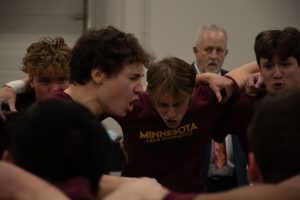While the majority of Americans spent the past few weeks celebrating the holidays with gifts, food and family, a large group of people spent this time in prayer, in fasting and in devotion.
At the University, more than 300 Muslims joined more than a billion worldwide in celebrating the month of Ramadan. During this month, which is the third pillar of the Muslim faith and the ninth month on the lunar calendar, Muslims abstain from anything pleasurable to the senses and nourishing to the body from dawn until sundown.
“The month is a month of introspection,” said Caesar Farah, professor of international studies at the University. “By denying the body of its desires, it helps you to assess what you are, who you are and where you want to be.”
The fast itself aims to satisfy three main goals. The first is to build a higher level of spirituality, the second is to form a closer connection with Allah and the third is to remember people who don’t have anything to eat or drink, said Haseena Hamzawala, a 24-year-old Muslim graduate student.
Every day during the fast, participants — Muslims who have reached puberty — rise an hour before dawn to pray and partake in a morning meal. After the sun sets, families and friends congregate to eat an evening meal.
Hamzawala said eating or drinking anything during the day, including water or medicine is prohibited. Chewing gum, applying lotion or having sex are all activities to be avoided during the daylight fast. Additionally, Muslims must not hear, say or smell anything immoral.
Depending on the devoutness of the individual, some prohibitions are enforced more than others. For example, some would completely stop listening to music, while others might listen to certain forms depending on whether they consider the lyrics good or bad, Hamzawala said.
Although all adults are required to participate as part of Islam, abstinence is more personal than communal.
“No one knows who is fasting,” said Muhammad Elrashidi, president of the Muslim Student Association. “It’s part of Ramadan, being a kind of worship that gets the believer to realize that it is God and only God that is always watching.”
The beginning of the fast is announced formally the day the new moon appears. This year Ramadan began on Dec. 19 and ends Jan. 17. Every year the dates change, as the religion of Islam follows a lunar rather than a solar calendar. Over the course of 10 years, the month of fasting occurs across the board, Farah said.
“The fast is easier now because the days are shorter, but it is hell in August,” said Hamzawala, who has followed the fast for about 10 years.
Although the fast disallows any sort of consumption for many hours at a time, Elrashidi said most adult Muslims are quite accustomed to it.
“You bear it — it is not just food,” he said. “Some people when they fast will only be hungry or thirsty, which blows off what it means to be fasting.”
In addition to the daylight fast of Ramadan, Muslims focus more intensely on prayer, which is the second pillar of Islam. Five times a day, every day of the year, Muslims pray facing the city of Mecca, the spiritual center of the religion. During this month, Muslims enforce praying even more strongly.
Eid-ul-Fitr marks the end of the month and brings a celebration and feast similar to the Christian celebration of Christmas or Easter. Often, children receive gifts and new clothes are bought and worn.
“Usually we say morning prayers at the mosque,” said Hamzawala. “Afterward we get together with family and friends, sit down and eat all day.”
Although Eid-ul-Fitr is one of the biggest celebrations of the year for Muslims, most organizations, such as the University, do not recognize the day as a holiday or give time off. Sentiments over having to work or go to school on this day are split, but tradition often outweighs regulation.
“Recognizing it would be a way people could get to know about it,” Elrashidi said. “The recognition is nice if others recognize Islam for what it really is.”








